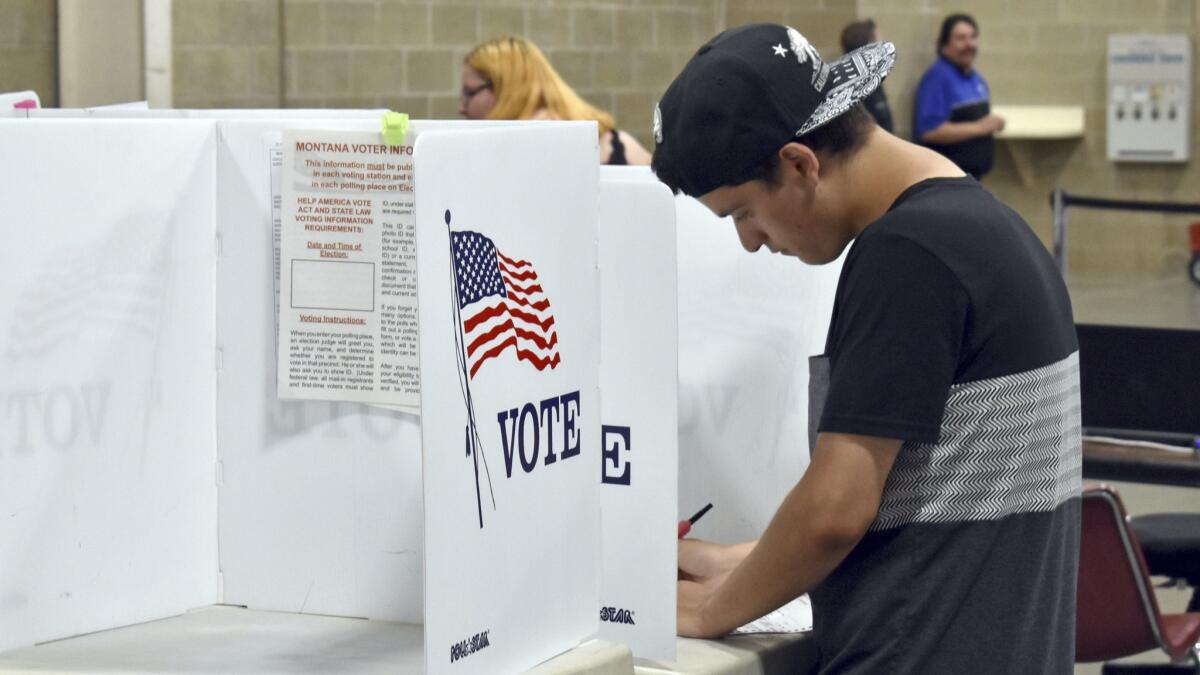Primaries in seven other states help set the political battlefield for November

- Share via
No state will play a more significant role in the fight for control of Congress than California. But seven other states also held primaries Tuesday, helping set the political battlefield for the first midterm election of Donald Trump’s presidency.
In New Jersey, Mikie Sherrill, a former federal prosecutor and Navy pilot and now the Democratic establishment favorite, bested a field of party rivals in the race to replace retiring Republican Rep. Rodney Frelinghuysen. She’ll take on GOP Assemblyman Jay Webber in one of several races Democrats view as prime opportunities in their effort to retake the House.
For the record:
1:20 p.m. June 8, 2018This article states that Kay Ivey is the first female governor of Alabama. That distinction belongs to Lurleen Wallace, who was elected in 1966 and died of cancer in 1968 after serving for 16 months.
Mississippi Republican Sen. Roger Wicker won his primary contest, as did New Jersey Sen. Robert Menendez, a Democrat who faced federal bribery charges last year. The jury deadlocked, but Republicans hope to use Menendez’s legal troubles to tar Democrats like Sherrill across the state.
Much of the day’s drama focused on women, who fought to make history in some cases and to avoid disaster in others.
In Alabama, four-term Republican Rep. Martha Roby was forced into a runoff election next month after failing to win 50% of her party’s vote. She will face former Democratic Rep. Bobby Bright in Alabama’s conservative 2nd District — where loyalty to Trump has been a central issue.
Roby was the first member of Congress to withdraw her endorsement of the Republican president in 2016 after he was caught on video bragging about grabbing women’s genitals.
In New Mexico, Democratic Rep. Michelle Lujan Grisham won her party’s nomination in the race to succeed outgoing Republican Gov. Susana Martinez. If Grisham wins, she’d be the state’s second Latina state executive.
Alabama Gov. Kay Ivey, the state’s first female governor, fended off three GOP challengers, while South Dakota Rep. Kristi Noem became the first female nominee for governor in her state.
In Iowa, 28-year-old Democratic state Rep. Abby Finkenauer was trying to become the youngest woman to serve in Congress. And in New Mexico, former state Democratic Party Chairwoman Debra Haaland, a tribal member of Laguna Pueblo, was making a bid to become the first Native American woman in Congress.
Haaland said in her primary victory statement: “Donald Trump and the billionaire class should consider this victory a warning shot: the blue wave is coming.”
With the possibility of a Democratic wave on the horizon, the election is a test of voter enthusiasm, candidate quality and President Trump’s influence as each party picks its nominees to face off in November.
In Montclair, N.J., voter Lynnette Joy Baskinger, a psychotherapist, said she’s fed up with the GOP.
“I still consider myself an independent, but I just won’t vote Republican because of what’s going on,” she said.
It was a different story in Mississippi, where 66-year-old Gladys Cruz wasn’t sure which Republican she would support in the state’s Senate primary, but she wants whoever wins to firmly support Trump.
The president “touches my heart,” she said.
Democrats must wrest at least 23 seats from Republican hands to claim the House majority this fall.
Because GOP retirements in the last year have made such a changeover more likely, Trump has urged Republicans to support the party’s congressional candidates.
“Keep our country out of the hands of High Tax, High Crime Nancy Pelosi,” Trump tweeted, referring to House Minority Leader Pelosi of San Francisco.
Significant developments played out across the country.
In New Jersey, Menendez earned the Democratic Party’s nomination for a third term despite being tainted by his recent federal bribery trial. Businessman Bob Hugin claimed the Republican nomination Tuesday and will face Menendez this fall.
In Montana, Republicans will pick a candidate to take on Democratic Sen. Jon Tester, who is among the most vulnerable Democratic senators in the nation. The GOP struggled to recruit top-tier candidates, leaving state Auditor Matt Rosendale and retired Judge Russ Fagg as the most likely nominees.
Democrats have aimed their most aggressive attacks at Rosendale, seizing on his background in Maryland and questions about his experience as a rancher.
UPDATES:
10:15 p.m.: This article has been updated with primary results from several states.
This article was originally published at 8:50 p.m.
More to Read
Sign up for Essential California
The most important California stories and recommendations in your inbox every morning.
You may occasionally receive promotional content from the Los Angeles Times.










